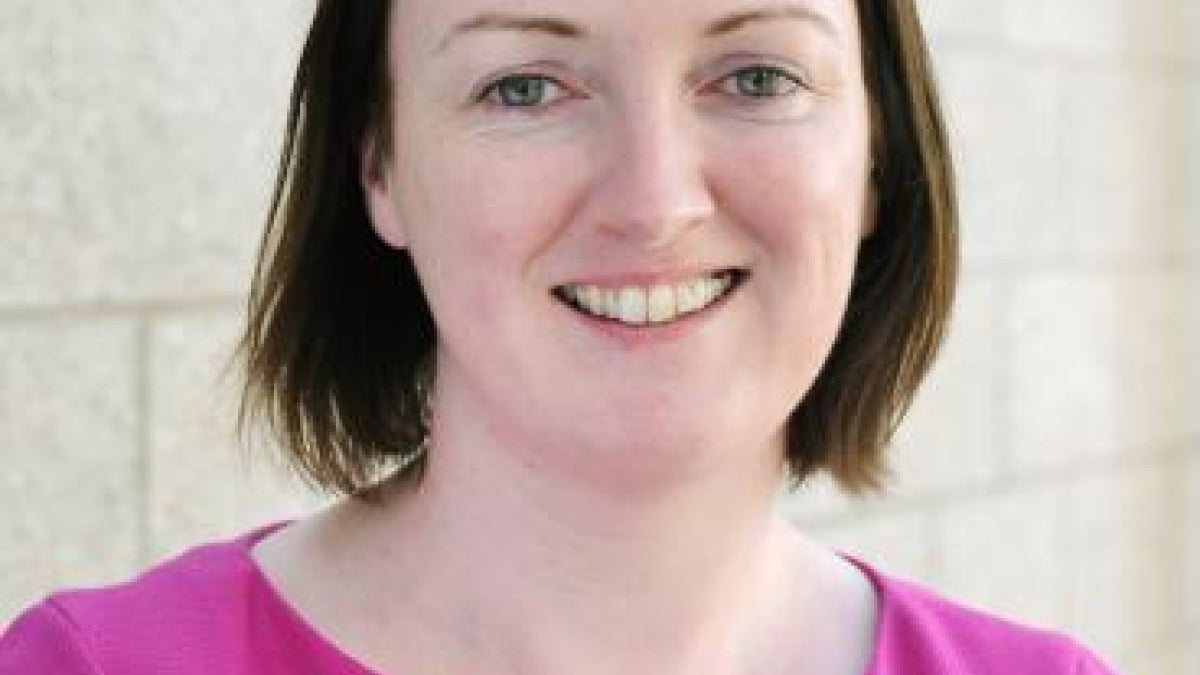ASU honors students think globally, work locally in Global Engagement Lab

Katherine O'Flaherty, Honors Faculty Fellow at Barrett, The Honors College at Arizona State University, teaches the Global Engagement Lab at the ASU Downtown campus. Photo courtesy of Barrett, The Honors College.
A unique class that challenges students to think and act globally has taken root at Barrett, The Honors College at Arizona State University's Downtown Phoenix campus. The Global Engagement Lab allows honors students to engage with global issues in their local community by working with non-profit, community-service organizations.
The Global Engagement Lab (GEL), now in its second semester, was developed through collaboration among Katherine O’Flaherty, Honors Faculty Fellow in Barrett at the Downtown Phoenix campus; Miranda Schultz, Barrett honors academic advisor; and downtown honors students Allison Tooms, a nursing major, and Rachel Baumgartner, a criminology major.
Over the last two years, the four worked together to think through and create the GEL, a project born from the realization that there were few academically focused, globally engaged community service opportunities for honors students. O’Flaherty and her team focused on trying to find something that revolved around engagement and had a unique honors spin to it, and that could lend a measurably broader and deeper experience to honors students. They spent many hours vetting documents, thinking through which organizations to partner with, and creating the course they envisioned.
“Given the economic, social and cultural divisions that characterize life in the 21st century we feel that honors education must engage directly in the community and support students’ exploration of life’s complexity,” O’Flaherty said.
“We noted that much has been written on service learning and the value of volunteerism to college students but little systematically examines the role of community engagement in student development and advancement. Virtually nothing has been written that focuses specifically on high-achieving students or honors students and the value of learning while embedded in the community,” she added.
In 2016, they finalized plans for the GEL and chose as a partner the International Rescue Committee (IRC), a global humanitarian aid, relief and development nongovernmental organization based in Phoenix.
The IRC offers emergency aid and long-term assistance to refugees and those displaced by war, persecution or natural disaster. The organization currently is working in more than 40 countries and 22 U.S. cities, including Phoenix, where it resettles refugees and helps them become self-sufficient.
O’Flaherty taught HON 394, The Global Engagement Lab (GEL) I, in fall 2016 with 12 students. She is teaching GEL II in the spring 2017 semester. Through the GEL Barrett students are working closely with IRC staff to create real, tangible solutions to complex challenges.
O’Flaherty said that the GEL allows honors students with diverse backgrounds, experiences, and majors to work together on projects.
“The Lab offers students the opportunity to work with community partners over a sustained period of time to develop in-depth understanding of potential solutions to challenges faced by the organizations,” she said, adding that students also have the opportunity to put the critical thinking skills they acquire in Barrett’s signature course, The Human Event, into action.
Early in the course, the GEL mainly focuses on discussion about the organization and presentations from IRC staff to enhance students’ understanding of relevant issues. Clear expectations are established to make sure student teams meet organizational needs and that students benefit from the experience. Throughout the course, students go to the IRC’s offices and facilities to assist the organization.
“This is neither just a volunteer opportunity nor a service-learning project. The GEL is grounded in an academically rigorous environment that builds on and enhances skills. It uses human-centered design to provide students the opportunity to create, innovate and serve. We believe the Global Engagement Lab has the potential to be a centerpiece of Barrett education,” O’Flaherty said.
O’Flaherty said IRC staff has expressed concern about federal funding due to the current political climate in which support for refugees and refugee organizations is dwindling, and are therefore looking into private grants. GEL students, who have strong research skills, are assisting the IRC in finding and applying for funding.
In addition to grant research, students engage in client interviews, observation, short- and long-term project management and volunteerism. All student work is done under the guidance of Barrett Honors College faculty who provide extensive contextual training to make sure that student teams are aware of the social, political, economic and cultural complexities in which they are working.
“The Lab brings faculty, staff, students, community partners and community members together and provides tangible ways for us to learn from one another and facilitate each other’s progress. As leaders in the 21st century it will be imperative that our students can see connections at the macro and micro level and consider local issues from a global perspective,” O’Flaherty said.
The GEL also has implications for students’ futures in the world of work, she said.
“Employers demand that employees learn and adapt to diverse audiences and that they are just and empathetic in the treatment of all people. A central objective of the Global Engagement Lab is to provide students with hands-on experience grappling with global issues and provide the opportunity to think through one’s role and responsibility as a global citizen.”
Lerman Montoya, a GEL student and journalism major, said the class has opened his eyes to current issues and provided a forum to address them.
“Right now I think it’s important that this class allows a student to gain a lot of information about the refugee process,” Montoya said. “I think a lot of the time, in the United States especially, we kind of have a blind eye toward international issues and, having the global aspect of this class, we are learning about the refugee crisis in a way that is more formal and educational. A lot of people come in with misconceptions about the refugee resettlement process and through this class we are learning how the process actually goes and the facts of what is a refugee. Knowing these processes and this vocabulary is very important to creating change.”
Tooms, who was a freshman when she began helping develop the GEL, will enter her senior year in August.
It has been gratifying to see the GEL in action, providing opportunities for students to build leadership and social skills, as well as work with a community partner, she said.
“It is definitely a challenge, but I think the most important thing is that students gain perseverance, patience, and the ability to work with different people that will help them in their future careers. To see honors students from different majors and backgrounds come together to help the community is awesome. It has been amazing to see it bloom and I am excited to see where it goes.”
Students in the Global Engagement Lab, in conjunction with the IRC, are hosting an event titled "From Harm to Home: A Community Discussion on Refugee Resettlement in Arizona" at 6 p.m. Friday, April 7 at Roosevelt Community Church, 924 N. 1st Ave. in Phoenix.
A panel of presenters, including IRS staff members, recently resettled refugees, and local refugee business owners, will speak about their experiences. IRC staff also will discuss the organization’s refugee settlement work. Panelists will take questions from the audience. This event, which is free and open to the public, also will feature children’s activities. More information is at http://tinyurl.com/FromHarmToHome.
More Local, national and global affairs

Department of State and ASU host Government Leaders Forum to strengthen semiconductor supply chains
By Emilia FrancoAs the global demand for semiconductors accelerates — with projections reaching $1 trillion by 2030 — Arizona…

Environmental writer, ER doctor address violence, climate change, more at sold-out ASU event
“The difficulty of understanding the consequences of heat is amplified by conventional notions of what it means to be hot. In pop…

Thunderbird at ASU, AUK student appointed as Ukraine’s deputy minister of education and science
Nadiia Kuzmychova, a student in the Master of Leadership and Management (MLM) program at Thunderbird School of Global…